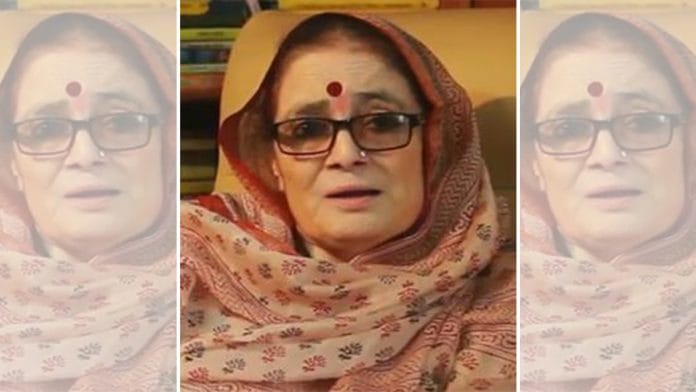New Delhi: Legendary Dogri poet and Sahitya Akademi awardee, Padma Sachdev died aged 81 at her home in Mumbai Wednesday.
In the preface of her first collection of poems, ‘Meri Kavita Mere Geet’, renowned poet Ramdhari Singh Dinkar wrote: “After reading Padma’s poem, I should throw my pen away — for what Padma writes indeed is true poetry.”
This anthology brought Sachdev into the spotlight in 1971, as well as the Sahitya Akademi award too. Later, she would come to be popularly known as ‘the mother of modern Dogri’.
In 2001, Sachdev was awarded the Padma Shri for her contribution to education and literature.
News of Sachdev’s death drew condolence messages from across the spectrum, from Jammu and Kashmir Lieutenant Governor Manoj Sinha to writer Amitabh Mattoo.
Karan Singh, son of the last Dogra king of J&K, Maharaja Hari Singh, also translated one of her poems into English and hailed her commitment to propagating the language.
Born in Jammu’s Purmandal in 1940, Sachdev was the eldest of three children of Sanskrit scholar Jai Dev Badu. Badu died in 1947, at the time of the partition of India.
Also read: 5 songs to remember Shakeel Badayuni, Hindi cinema’s romantic poet
‘Too young to die’
Academician and former JNU professor Pushpesh Pant, whose association with Padma Sachdev goes back 50 years, recalls her as a generous person who was “full of life”.
“She represented the best of Dogri-Kashmiri-Punjabi heritage. She was married into a Sikh family — her husband is Surinder Singh, part of the famous Singh Bandhu musical duo and a disciple of Ustaad Amir Khan. Sachdev had a troubled past but she never discussed it or brought it up. She lived an enriched life,” he told ThePrint. Singh was her second husband.
“Padma Ji was so young for her age … when I first heard the news of her death, I was more surprised than sad. I realised that even people who are so full of life also have to go away one day,” Pant added.
Amitabh Mattoo, author and professor at JNU, remembers Sachdev as a front-ranking Dogri poet of her generation, who played an important role in the revival of the language. “I feel a personal sense of loss as she was part of my social circle … She had left a bad marriage behind and remarried, which was a courageous decision,” he told ThePrint.
Literary style
The rich oral tradition of Dogri folklore and folktales inspired Sachdev to write in Dogri. Her first poem was published in a local newspaper in 1955. She later joined All India Radio as an announcer in 1966.
After three years, in 1969, she published her first poetry collection ‘Meri Kavita Mere Geet’.
Not just Dogri, Sachdev had good command over Hindi and Sanskrit as well. She also wrote poems, short stories, and novels in Hindi. Later, she went on to compose lyrics for two Hindi films, Prem Parvat and Aankhin Dekhi, and translated several works from Urdu, Oriya and Marathi into Hindi and Dogri.
”Her literature depicts the joys and sorrows, mood and misfortunes of Indian womanhood. Even though she is conscious of the social injustices heaped upon women, her woman characters maintain their dignity at all times,” the Sahitya Akademi notes in a short profile of the poet on its website.
Her poem ‘Raje Diyan Mandiyan’ is a scathing attack on the feudal system and portrays the plight of an average poor Dogra woman. “Those who beat our shaking hands … those who emptied out our treasured troves, are those hunched horses yours?”, a woman asks the kings in this poem.
Sachdev also composed the tunes of Lata Mangeshkar’s first Dogri music album, which featured famous songs like ‘Bhala Shapaia Dogariya’, ‘Toon Mala Toon’ — songs still hummed today.
(Edited by Paramita Ghosh)
Also read: Epic of Gilgamesh to return to Iraq 18 yrs after being looted as US gives back 17,000 artifacts






